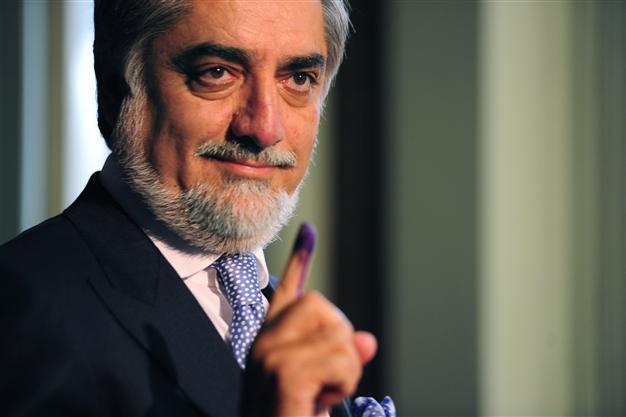Abdullah leads Ghani in first partial results of Afghan vote
KABUL, Afghanistan - Agence France-Presse

In this photograph taken on April 5, 2014, Afghan Presidential Candidate Abdullah Abdullah shows his inked finger as he casts his vote at a local polling station in Kabul. AFP Photo
Former foreign minister Abdullah Abdullah is leading his closest rival Ashraf Ghani in early results from the Afghan presidential election, the Independent Election Commission (IEC) said Sunday, but figures indicate a likely run-off vote.The eventual winner will have to lead the fight against a resurgent Taliban as US-led combat troops prepare to leave at year-end, and strengthen an economy reliant on declining aid money.
"Today we announce the partial results of 26 provinces with 10 percent of votes counted, these include (provinces) in the north, south, east, west and Kabul," said Ahmad Yousuf Nuristani, the IEC chief.
"With 500,000 votes from 26 provinces Dr Abdullah is leading with 41.9 percent; Dr Ashraf Ghani has 37.6 percent and is in second; and Zalmai Rassoul has 9.8 percent in third position." Nuristani stressed the figure was only partial and could change drastically in coming days, when more partial results would be announced.
A run-off election between the two leading candidates will be triggered if no single candidate gains more than 50 percent of the vote when the final results are announced in late May.
But Nuristani cautioned against reading too much into the early results.
"These results are changeable... today one candidate might be leading but when we announce more results another candidate might be leading," he said.
Of the eight provinces for which results have not been announced, two are in the north (Badakhshan and Baghlan) and two in the east (Nuristan and Paktika). The others are Daykundi in the centre, southern Ghazni and Wardak and the western province of Ghor.
The United Nations Assistance Mission in Afghanistan welcomed the announcement as a "first snapshot that will regularly be updated by the IEC".
"I urge presidential candidates and their supporters to display patience while vote tallying is completed," said Jan Kubis, UN Special Representative to Afghanistan, in a statement.
Abdullah, who was born to an ethnic Pashtun father and a Tajik mother, is more associated with the northern Tajiks.
More than seven million people defied bad weather and Taliban threats of violence to vote in the April 5 first round of the election, earning praise from world leaders.
Ahead of the vote there were fears that a repeat of the massive fraud which blighted Karzai's re-election in 2009 would undermine the winner's legitimacy at a testing time for the war-torn country.
But the Election Complaints Commission announced Sunday there had been "less fraud" in the current poll.
"We have received 1,892 complaints with evidence, (including) 1,382 through phone," said spokesman Nader Mohseni, adding that 870 of the complaints fell into the most serious category.
"We will review all the complaints. Based on the reviews and numbers provided by the observers there has been less fraud in this election compared to the previous one," he said.
Ghani's camp was set to hold a press conference later on Sunday to discuss the partial results.
Abdullah, an ophthalmologist by training, came second in the 2009 election to current President Hamid Karzai, in a vote that was internationally denounced as fraudulent.
He was a resistance fighter against the Soviet occupation in the 1980s and was a close friend and adviser to Ahmad Shah Massoud, a revered Tajik leader who fought the Taliban during their 1996-2001 rule and was assassinated two days before the September 11, 2011 attacks on the United States.
Ghani is a former World Bank economist and globally renowned intellectual, who has shed some of his wonkish image during his current campaign and is more favoured by the country's majority Pashtuns.
Former physician Zalmai Rassoul, another Pashtun, was seen as Karzai's favourite -- a charge which he denied.
All three pre-election favourites have pledged to protect women's rights, reach out for a peace deal with the Taliban and sign a bilateral security pact with the United States that would allow at least 10,000 troops to stay for the next ten years.
















